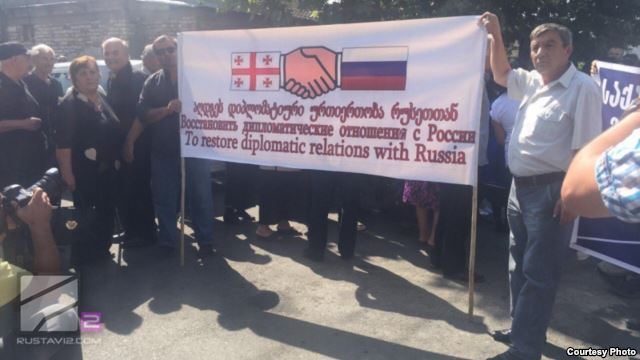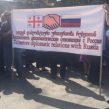
Pro-Russian Forces in Georgia Demand Neutral Status for Country
Publication: Eurasia Daily Monitor Volume: 12 Issue: 182
By:

Around 200 activists of the pro-Russian organization “The Society of Tsar Irakly II” marched through the streets of the Georgian capital of Tbilisi, on September 24. The protest concluded in front of the Avlabar Palace—the residence of the president of Georgia. Supporters of former president Mikheil Saakashvili, from the non-profit organization Free Zone, attempted to block the march, but police pushed them aside. Law enforcement briefly detained one of Free Zone’s members (GPB, YouTube, September 24).
The chairman of The Society of Tsar Irakly II, Archil Chkoidze, stated at the rally that the participants of the protest action demand Georgian President Giorgi Margvelashvili “declare the country militarily and politically neutral” (Svoboda.org, September 24). However, the primary slogan of the rally was to restore diplomatic relations with the Russian Federation, which had been frozen by Saakashvili after the Five Day War of 2008 (Russia-direct, August 5, 2013).
The namesake of this pro-Russian Georgian group, Tsar Irakly (a. k. a. Heraclius) II (1720–1798), came from the royal house of Bagratids. The tsar is known primarily for signing the Treaty of Georgievsk with the Russian Empire in 1783 (Hist.msu.ru, accessed October 8). The majority of Georgian historians agree that the treaty resulted in the loss of Georgia’s sovereignty in 1801 (Caucasustours.com, accessed October 8).
The pro-Russian sentiment of the leaders and members of the Irakly II Society manifested itself in their statements at the rally. One of the demonstration’s most active participants, Georgian Communist Party leader Avtandil Margiani, declared, “Russia had saved Georgia several times and is prepared to save it again.” One unidentified female speaker at the rally demanded Georgia’s accession to the Russian Federation and warned that “everybody should be fearful of the pro-Russian forces because we are coming” (Kvirispalitra, September 25).
After the rally stopped outside the presidential palace, Archil Chkoidze proclaimed that Georgia should drop its plans to gain membership in any military bloc, including the North Atlantic Treaty Organization (NATO). “Europe and the United States did not do anything for Georgia, hence our demands have no other alternatives,” Chkoidze said (Svoboda.org, September 24). Additionally, he argued that Georgia should consider joining the Eurasian Economic Union, which was established in the post-Soviet space under the guidance of Russian President Vladimir Putin. In an exclusive interview with this author, Chkoidze stated that he “did not see any contradiction between the demand for neutrality and a possible treaty with the Eurasian Union” (Author’s interview, October 3).
Chkoidze’s statements and those of the other leaders of the Irakly II Society raise serious doubts about whether these individuals have a clear understanding of the term “neutrality.” An analyst with the news agency Prime News Georgia, Nika Imanaishvili, told this author: “I think, when they talk about ‘neutrality,’ they, in fact, mean becoming part of the Russian zone of influence.” Imanaishvili admitted that the idea of declaring neutrality is popular among certain parts of Georgian society. “Many Georgians are disappointed by NATO’s repeated refusals to grant a MAP [Membership Action Plan] to Georgia. However, those people do not understand the main issue—Georgia’s wish to become a neutral country is not sufficient. Neighboring countries, first of all Russia, must respect Georgia’s neutrality. However, Moscow regards our country as part of its sphere of influence and is not going to agree with its neutral status,” the analyst said (Author’s interview, October 3).
The leader of the party Neutral Georgia, Valery Kvaratskhelia, who has been a pro-Russian politician since the early 1990s, said that his organization did not take part in the September 24 rally in Tbilisi. Kvaratskhelia believes that asking President Giorgi Margvelashvili to declare Georgia a neutral country was a senseless exercise because the president “is an Atlanticist, along with the majority of the dominant political class in Georgia.” Still, Neutral Georgia’s leader agrees with Chkoidze in principle and thinks that neutrality is “the only possibility to make peace with Russia, resume friendly, partner and allied relations, and stop the war that has been going on for the past 25 years” (Author’s interview, September 25).
Encouraging neutrality for Georgia has become a key part of the agenda for the country’s various pro-Russian organizations, particularly as Moscow has ramped up the use of its “soft power” to advance Russian interests in the Caucasus (see EDM, April 2, 2014). The sources of funding for such activities by these Georgian organization is, therefore, important to explore. Kvaratskhelia has pointedly rejected claims that his party may be funded by Russia. Chkoidze also denies his organization has ties to any Russian institution. “The office of our organization is in my own house. If anyone supported us financially, do you think we would have worked in such conditions?” the leader of the Society of Tsar Irakly II asked this author rhetorically. Yet, Chkoidze added: “If, however, someone decides to provide funding for our activities, we will not mind. We will accept financial support with alacrity and spend the money for the benefit of the Georgian people. Why not, if the West funds the pro-Western parties and the pro-Western NGOs [non-governmental organizations]?” (Author’s interview, September 25, October 3).
Such comparisons and parallels are not entirely justified, however, since neither the United States nor any European Union members occupy 20 percent of Georgian territory. Therefore, the vast majority of the country’s political class is not only opposed to neutrality, but in fact supports Georgia’s membership in NATO. All factions in the current Georgian parliament share this opinion. Both the ruling Georgian Dream coalition and the opposition party of former president Saakashvili, the United National Movement (UNM), say they are in favor of Euro-Atlantic integration.
Former speaker of the parliament Nino Burjanadze is perhaps the only exception among Georgia’s influential politicians in this regard. Burjanadze openly speaks against NATO membership and advocates for the resumption of diplomatic relations with Russia, despite the presence of Russian embassies in the breakaway Georgian regions of Abkhazia and South Ossetia. “Yes, Russian military forces are stationed on those territories, but the Kuril Islands are also under the control of the Russian Federation. Does this prevent Japan from having diplomatic relations with Moscow?” Burjanadze asked in an interview with this author, shortly before her next visit to Russia (Author’s interview, September 17).
President Margvelashvili made no comments at the rally for Georgian neutrality. However, according to UNM parliamentarian Nugzar Tsiklauri, “The increase in activities by pro-Russian forces after the Georgian Dream coalition came to power clearly indicates that the coalition and its leaders are not entirely sincere in their official declarations” (Author’s interview, September 25). Pro-Russian sentiment in Georgia is clearly becoming more visible, and it remains to be seen how this will influence the platforms of the country’s main political parties over the coming months.




